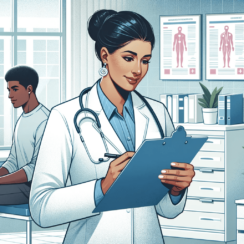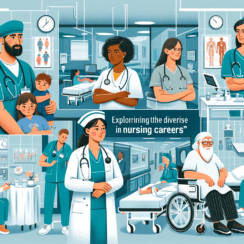
What Is a Registered Nurse (RN) and what do they do?
Nursing, a profession that blends the art of caring with the science of health care, stands as a crucial pillar in the healthcare system. Nurses are the backbone of patient care, offering essential support to both patients and the broader medical team. The role of a nurse extends beyond mere medical duties; it encompasses a holistic approach towards patient care, emphasizing physical, emotional, and psychological well-being.
Profession Overview
The origin of nursing can be traced back to ancient times, but it was the pioneering work of Florence Nightingale in the 19th century that laid the foundation for modern nursing. Today, nursing has evolved into a diverse and dynamic field, with nurses playing pivotal roles in health promotion, disease prevention, and patient care across various settings. The scope of nursing practice varies globally, but it universally shares a commitment to delivering high-quality care and improving patient outcomes.
Nurses are often the first point of contact for patients in the healthcare system. Their responsibilities are multifaceted, involving direct patient care, patient education, and coordination of care among different healthcare professionals. They work in a variety of environments, including hospitals, clinics, community health centers, schools, and residential care facilities. The nature of nursing is such that it requires a blend of technical skills, clinical knowledge, and compassionate care, making it a uniquely challenging and rewarding profession.
This introductory section will delve into the fundamental aspects of nursing, highlighting the role, importance, and evolution of the nursing profession. It will provide an insightful overview of what it means to be a nurse and the significant impact nurses have on the health and well-being of individuals and communities. The journey into the world of nursing begins here, laying the groundwork for a deeper understanding of this noble and essential profession.
Defining the Role

The role of a nurse is multifaceted and extends well beyond the traditional view of bedside care. Nurses serve as caregivers, educators, advocates, and coordinators in the healthcare system. Their primary responsibility is to ensure the safety and well-being of patients by providing direct care, which includes administering medications, monitoring patient health, and providing personal care and support.
Nurses also play a critical role in patient education. They are responsible for teaching patients and their families about health conditions, treatment plans, and healthy lifestyle choices. This aspect of nursing is crucial for empowering patients to take an active role in their own healthcare. Nurses must be adept at communicating complex medical information in a way that is understandable and accessible to patients of all backgrounds.
Advocacy is another key element of the nursing role. Nurses advocate for patients’ rights and well-being, ensuring that patients receive appropriate and ethical care. They are often the mediators between patients and other healthcare professionals, voicing the concerns and preferences of the patients. This advocacy extends to public health, where nurses work to promote health and prevent disease within communities.
Coordination of care is a significant responsibility for nurses, particularly in settings with complex patient needs. They collaborate with a multidisciplinary team of healthcare professionals, including doctors, therapists, and social workers, to develop and implement comprehensive care plans. This requires excellent organizational and communication skills, as well as a thorough understanding of each patient’s unique health situation.
In addition to these roles, nurses are involved in research, management, policy development, and quality improvement in healthcare. They are constantly adapting to new technologies, treatments, and evidence-based practices, making them lifelong learners and innovators in healthcare.
This section has explored the diverse roles and responsibilities of nurses. Their contributions are not only vital to patient care but also to the advancement of the healthcare system as a whole. Nurses' roles are expanding and evolving, reflecting the complexity and dynamism of the healthcare landscape.
Skills and Qualities of a Nurse
Nursing is a demanding profession that requires a unique combination of skills and personal attributes. The effectiveness of a nurse is not just in their clinical abilities, but also in their interpersonal skills and character traits. Below is a list of key skills and qualities essential for success in nursing:
Core Nursing Skills
-
Clinical Expertise: Proficiency in medical procedures, patient care, and emergency responses.
-
Medication Administration: Accurate calculation and administration of medications.
-
Technology Skills: Ability to use medical equipment and healthcare software.
- Patient Assessment: Conducting comprehensive patient evaluations and monitoring.
Interpersonal Skills
-
Communication: Clear and compassionate communication with patients, families, and healthcare teams.
-
Empathy: Understanding and responding to the emotional needs of patients.
-
Teamwork: Collaborating effectively with other healthcare professionals
-
Conflict Resolution: Managing disputes and challenges in a professional manner.
Personal Qualities
-
Compassion: Genuine care and concern for the well-being of patients.
-
Resilience: Ability to cope with stressful and emotionally challenging situations.
-
Attention to Detail: Meticulous in following protocols and noticing changes in patient conditions.
-
Adaptability: Flexibility in handling diverse patient needs and healthcare settings.
These skills and qualities are integral to a nurse's ability to provide high-quality care and to thrive in the ever-changing landscape of healthcare. Continuous development and refinement of these skills are crucial for personal and professional growth in nursing.
Educational Requirements and Certifications
To embark on a career in nursing, specific educational qualifications and certifications are required. These not only provide the foundational knowledge and skills necessary for nursing but also ensure adherence to standardized, high-quality care. This section outlines the key educational paths and certifications for aspiring nurses.
Basic Educational Requirements
-
Associate Degree in Nursing (ADN): A 2-year program focusing on basic nursing skills and patient care.
-
Bachelor of Science in Nursing (BSN): A 4-year degree offering comprehensive training in nursing theory, research, and leadership.
Licensure
Upon completing an accredited nursing program, nurses must obtain licensure:
-
NCLEX-RN: The National Council Licensure Examination for Registered Nurses is a standardized exam that assesses the knowledge and skills necessary for entry-level nursing practice.
Advanced Educational Opportunities
-
Master of Science in Nursing (MSN): Advanced degree for specialized roles like nurse practitioner, nurse educator, or nurse administrator.
-
Doctor of Nursing Practice (DNP) or PhD in Nursing: Doctoral programs for advanced clinical practice, leadership, or academic roles.
Specialty Certifications
Nurses can further specialize and certify in areas such as:
-
Critical Care Nursing
-
Pediatric Nursing
-
Oncology Nursing
-
Geriatric Nursing
Education and certification in nursing are ongoing processes, with continuous learning and upskilling being integral to the profession. Nurses are encouraged to pursue further education and specialty certifications to advance their careers and enhance the quality of care provided to patients.
Areas of Specialization in Nursing
Nursing offers a vast array of specialization areas, allowing nurses to focus on specific patient populations, health conditions, or environments. Each specialization requires unique skills and knowledge, often necessitating additional training or certification. This section explores some of the common and in-demand specializations within the nursing field.
-
1
Clinical Specializations
-
Pediatric Nursing: Specializing in the care of infants, children, and adolescents.
-
Geriatric Nursing: Focused on caring for elderly patients with unique health needs.
-
Oncology Nursing: Providing care and support for cancer patients.
-
Emergency Nursing: Delivering acute care in emergency settings.
-
Operating Room Nursing: Assisting in surgical procedures and patient recovery.
-
-
2
Community and Public Health Nursing
-
Community Health Nursing: Focusing on health promotion and disease prevention in community settings.
-
School Nursing: Addressing the health needs of students in educational institutions.
-
-
3
Advanced Practice Specializations
-
Nurse Practitioner (NP): Providing advanced clinical care, often with a focus on specific patient populations.
-
Clinical Nurse Specialist (CNS): Expertise in a specific area of nursing practice, such as a disease, population, or type of care.
-
Nurse Anesthetist (CRNA): Specializing in anesthesia care and pain management.
-
-
4
Nursing Research and Education
-
Nurse Educator: Teaching and mentoring the next generation of nurses.
-
Nurse Researcher: Conducting research to improve nursing practices and patient outcomes.
-
Specialization in nursing allows nurses to pursue areas they are passionate about, furthering their expertise and enhancing patient care. It also opens up opportunities for career advancement and leadership roles within the healthcare sector.
Event Manager’s Toolkit
In the dynamic field of nursing, proficiency in various tools and technologies is essential. These tools not only aid in providing effective patient care but also ensure efficiency and accuracy in nursing practices. This section highlights the key tools and technologies commonly utilized by nurses in their daily work.
Medical Equipment and Instruments
-
Stethoscopes: Essential for assessing heart and lung sounds.
-
Sphygmomanometers: Used for measuring blood pressure.
-
Thermometers: Critical for monitoring body temperature.
-
IV Pumps and Syringes: For administering medications and fluids.
-
Wound Care Supplies: Necessary for dressing changes and wound management.
Healthcare Information Systems
-
Electronic Health Records (EHR): Digital systems for patient data management.
-
Medication Administration Records (MAR): To accurately track medication dispensing.
-
Patient Monitoring Systems: For continuous observation of vital signs.
Communication and Coordination Tools
-
Handheld Devices: Smartphones or tablets for accessing patient information and communication.
-
Nurse Call Systems: Allowing patients to alert nursing staff when assistance is needed.
Personal Protective Equipment (PPE)
Gloves, Masks, and Gowns: Essential for infection control and maintaining a sterile environment.
Staying adept with these tools and technologies is crucial for nurses to provide high-quality care. Continuous training and adaptation to new advancements in healthcare technologies are integral parts of the nursing profession.
Career Opportunities and Pathways in Nursing
The nursing profession offers a wide range of career opportunities and pathways, catering to various interests, skills, and career goals. Nurses have the flexibility to work in different healthcare settings and specialize in areas that align with their passions and expertise. This section explores the diverse career paths available within the field of nursing.
Hospital Nursing
Many nurses begin their careers in hospital settings, providing direct patient care in departments such as emergency, surgery, pediatrics, or oncology. Hospital nurses face fast-paced environments and have opportunities to work with a variety of patient populations.
Community Health Nursing
Nurses in community health work outside traditional hospital settings. They focus on health education, disease prevention, and addressing public health issues in communities. This role often involves outreach and health promotion activities.
Specialized Nursing Roles
With additional training and certifications, nurses can specialize in fields like gerontology, neonatal care, or cardiac nursing. These specialized roles require specific skills and knowledge, offering nurses the chance to focus on areas they are passionate about.
Advanced Practice Nursing
Nurses with advanced degrees, such as Nurse Practitioners (NPs) or Clinical Nurse Specialists (CNS), provide higher levels of patient care, often with a focus on particular health conditions or patient groups. They may also have prescriptive authority and perform diagnostic tests.
Nursing Leadership and Administration
Experienced nurses can move into leadership roles, such as nurse managers or healthcare administrators. These positions involve overseeing nursing staff, managing budgets, and developing healthcare policies and procedures.
Nursing Education and Research
Nurses with a passion for teaching and research can pursue careers in academic settings, training future nurses, and conducting research to advance the field of nursing.
Each career path in nursing offers unique challenges and rewards, contributing significantly to the healthcare system and patient care. Nurses can transition between different roles throughout their careers, gaining diverse experiences and continuously growing professionally.
Challenges and Rewards of a Nursing Career
Nursing is a profession marked by unique challenges and significant rewards. Those who choose this path are often driven by a desire to make a positive impact on the lives of others, yet they must also navigate the complexities and demands of the healthcare environment. This section delves into both the challenges nurses face and the rewards that make the profession profoundly fulfilling.
Challenges in Nursing: Nurses often work in high-pressure environments that require quick thinking and resilience. Long hours, physical demands, and emotional strain are common, particularly in areas like emergency care or critical care nursing. Nurses must also stay updated with rapid advancements in healthcare and manage complex patient needs, which requires continual learning and adaptation.
Dealing with life-and-death situations can be emotionally taxing, and nurses frequently encounter situations that test their emotional and ethical boundaries. Additionally, navigating the dynamics of healthcare teams and advocating for patient rights can present interpersonal challenges.
Despite these challenges, the nursing profession offers numerous rewards that attract individuals to the field. The most significant reward is often the profound sense of fulfillment that comes from improving and saving lives. Nurses witness the direct impact of their care on patients and their families, creating a deep sense of purpose and accomplishment.
Nurses also benefit from a high degree of job security and flexibility. The demand for skilled nurses is consistently strong, and the profession offers various paths for advancement and specialization. Nurses have the opportunity to work in diverse environments, from bustling city hospitals to rural clinics, and can often find schedules that suit their lifestyle.
The camaraderie among nursing and healthcare teams can be incredibly supportive, providing a network of colleagues who understand the unique challenges and joys of the profession. Furthermore, nursing is a respected career, garnering admiration and trust from the community for the essential care and service provided.
Ultimately, while the path of nursing is demanding, it is equally rewarding. It offers a dynamic career filled with opportunities for personal growth, professional development, and the ability to make a lasting difference in people’s lives.
Continuing Education and Professional Development
Continuing education and professional development are cornerstones of a successful nursing career. The healthcare field is constantly evolving, with new research, technologies, and practices emerging regularly. For nurses, staying informed and enhancing their skills is not just a requirement but a professional duty. This section discusses the importance and avenues for ongoing learning and development in the nursing profession.
Continuing education for nurses comes in many forms, including formal education programs, workshops, conferences, and online courses. These opportunities allow nurses to stay current with the latest medical advancements, learn new skills, and gain knowledge in specialized areas. Many nursing positions require a certain amount of continuing education units (CEUs) to maintain licensure and certifications.
Professional development in nursing goes beyond academic learning. It includes developing leadership skills, engaging in mentorship roles, participating in professional nursing organizations, and contributing to policy development. Nurses can take on advanced roles in healthcare teams, lead initiatives for quality improvement, and play a critical part in shaping healthcare delivery systems.
For those interested in academic and research careers, continuing education might involve pursuing advanced degrees such as a Master’s or Doctorate in Nursing. These degrees open doors to roles in nursing education, research, administration, and higher-level clinical positions. They enable nurses to contribute profoundly to the advancement of nursing science and healthcare policies.
Personal development is also a key aspect of a nursing career. Nurses often develop strong problem-solving skills, emotional intelligence, and the ability to work effectively under pressure. These skills are honed through experience and reflective practice, making nurses valuable members of any healthcare team.
In conclusion, the path of nursing is one of lifelong learning and growth. Through continuing education and professional development, nurses not only enhance their own careers but also contribute to the overall improvement of healthcare services and patient outcomes.
Concluding Remarks on Nursing as a Career
The journey through the various facets of nursing underscores the profound impact and significance of this profession. Nurses are not just caregivers; they are vital components of the healthcare system, advocates for patient welfare, and contributors to medical advancements. This concluding section reflects on the essence of nursing as a career and its indispensable role in healthcare.
Nursing is a profession that demands a unique combination of scientific knowledge, technical skill, and compassionate care. It is a career that requires heart and dedication, as nurses often find themselves at the forefront of patient care, making critical decisions that affect health outcomes. The versatility of nursing allows for a rich and varied career, full of opportunities for growth, specialization, and making a tangible difference in people’s lives.
The impact of nursing extends beyond individual patient care. Nurses play a key role in shaping healthcare policies, improving care standards, and leading health promotion initiatives. Their insights and experiences are invaluable in driving forward the quality and effectiveness of healthcare services. As educators, researchers, and leaders, nurses contribute to the broader goal of improving public health and advancing the field of medicine.
Choosing nursing as a career means embarking on a path that is challenging yet immensely rewarding. It is a profession characterized by lifelong learning, adaptability, and a commitment to excellence in care. Nurses earn the respect and gratitude of the communities they serve, and their work leaves a lasting imprint on the lives of countless individuals.
In summary, nursing is more than a profession; it is a calling. It offers a unique opportunity to blend scientific knowledge with human compassion, making a real difference in the world. For those who choose this path, nursing is not just a job but a way of contributing to the betterment of society, one patient at a time.



